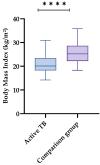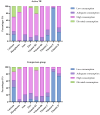Nutritional Factors and Food and Nutrition Insecurity in Patients with Tuberculosis
- PMID: 40077748
- PMCID: PMC11901461
- DOI: 10.3390/nu17050878
Nutritional Factors and Food and Nutrition Insecurity in Patients with Tuberculosis
Abstract
Background/Objectives: Brazil has a high incidence of new tuberculosis cases influenced by socioeconomic factors. Inadequate housing, limited access to health services, and insufficient food increase vulnerability to the disease. This study aimed to identify sociodemographic, nutritional, and anthropometric factors associated with active pulmonary tuberculosis. Methods: This case-control study was conducted at the tuberculosis (TB) Referral Hospital in São Luís, Maranhão, Brazil, from 2022 to 2024. It included 65 patients with active pulmonary TB and 73 comparison individuals. Sociodemographic and nutritional data were collected using an adapted semi-quantitative questionnaire with 77 items, based on the validated ELSA-BRASIL questionnaire for adults, to assess the consumption of calcium, phosphorus, iron, zinc, vitamin B3, vitamin B6, vitamin C, vitamin E, and vitamin D. The Brazilian Food Insecurity Scale (EBIA) was used to analyze food and nutrition security or insecurity. Body Mass Index (BMI) was calculated based on weight and height measurements. Results: The TB patients were predominantly men (73.8%), of mixed ancestry (69.4%), with low education levels (73.4%), and had a mean age of 39 years. Furthermore, 26.2% of the patients were underweight, and 64% experienced some degree of food and nutrition insecurity. The variables education level, vitamin D, and BMI were associated with the outcome in the final model. Conclusions: The study identified a high prevalence of food insecurity and vitamin E deficiency in individuals with active tuberculosis, in addition to associating low educational levels, inadequate vitamin D intake, and overweight with a higher risk of TB. Although it has limitations, such as the cross-sectional design and sample size, the results highlight the importance of these determinants and point to the need for longitudinal research to confirm and expand the evidence.
Keywords: Mycobacterium tuberculosis; malnutrition; nutritional status.
Conflict of interest statement
The authors declare no conflicts of interest.
Figures



References
-
- World Health Organization . Global Tuberculosis Report 2021: Supplementary Material. World Health Organization; Geneva, Switzerland: 2022.
-
- Tabnet. Department of Informatics of SUS–DATASUS, Ministry of Health; Brasilia, Brazil: 2022. [(accessed on 24 October 2023)]. Available online: https://datasus.saude.gov.br/acesso-a-informacao/casos-de-tuberculose-d...
-
- Ministry of Health . Brazil Free of Tuberculosis: National Plan to End Tuberculosis as a Public Health Problem: Strategies for 2021–2025. Department of Chronic Conditions Diseases and Sexually Transmitted Infections, Ministry of Health, Health Surveillance Secretariat; Brasilia, Brazil: 2021.
MeSH terms
LinkOut - more resources
Full Text Sources
Medical

